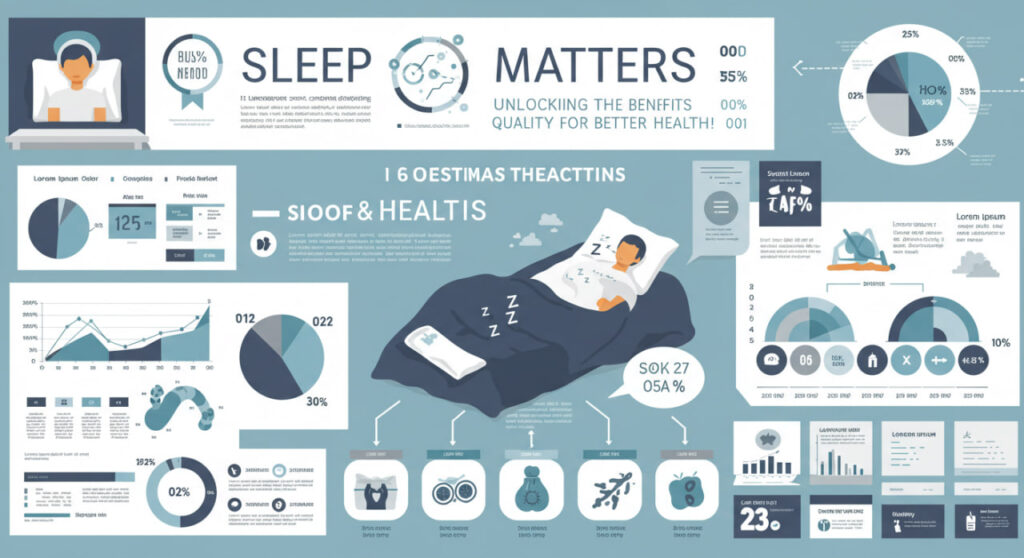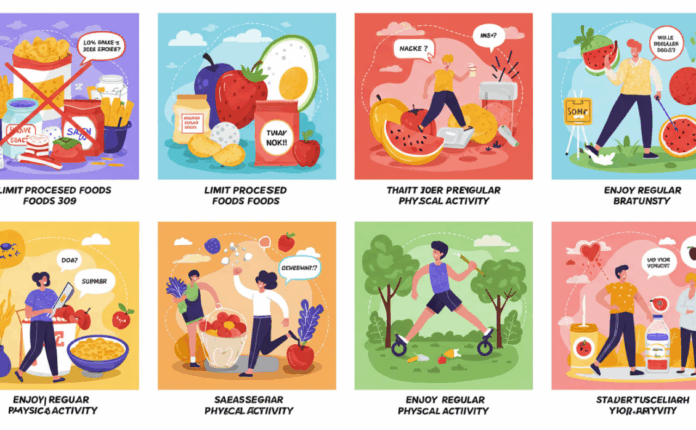In today’s fast-paced world, sleep often takes a backseat to work, social commitments, and endless screen time. Yet, quality rest is a cornerstone of physical and mental well-being, influencing everything from mood to productivity to long-term health. This article dives deep into why sleep matters, exploring the science behind it, its transformative benefits, and practical ways to improve your sleep quality. Whether you’re a night owl burning the midnight oil or someone striving for a healthier lifestyle, understanding the power of rest can be a game-changer.
Why Sleep Is More Than Just Rest
Sleep is not merely a pause from daily activities; it’s an active process where your body and brain perform critical maintenance. During sleep, your brain processes information, consolidates memories, and clears out toxins accumulated during the day. Meanwhile, your body repairs tissues, regulates hormones, and strengthens the immune system. According to the National Sleep Foundation, adults need 7-9 hours of sleep per night to function optimally, yet nearly 40% of adults report getting less than this. Chronic sleep deprivation has been linked to serious health issues like obesity, diabetes, heart disease, and even a shortened lifespan.
The benefits of quality sleep extend beyond physical health. Ever notice how a good night’s rest leaves you feeling sharper and more focused? That’s because sleep enhances cognitive functions like problem-solving, decision-making, and creativity. It also stabilizes emotions, reducing irritability and stress. In essence, sleep acts like a reset button, preparing you to tackle the challenges of a new day with clarity and energy.
The Science Behind Sleep Cycles
To fully appreciate sleep’s benefits, it’s worth understanding how it works. Sleep occurs in cycles, typically lasting 90 minutes, with each cycle consisting of four stages: three non-REM (rapid eye movement) stages and one REM stage. The non-REM stages progress from light sleep (Stage 1) to deep, restorative sleep (Stage 3), where physical repair happens. REM sleep, often called the “dream stage,” is crucial for memory consolidation and emotional processing. A full night’s sleep allows you to cycle through these stages multiple times, ensuring both body and mind are rejuvenated.
Disrupting these cycles—whether through late-night scrolling or irregular sleep schedules—can prevent you from reaching the deeper stages of sleep. Wearable tech like the Fitbit Versa 4 or Oura Ring can track your sleep stages, providing insights into how much time you spend in each phase. These devices use heart rate variability and movement data to estimate sleep quality, helping you identify patterns and make adjustments for better rest.
The Health Benefits of Quality Sleep
Quality sleep is a powerhouse for your health, delivering benefits that ripple across every aspect of life. Let’s break down some of the most compelling reasons to prioritize rest.
Physical Health: A Foundation for Longevity
Sleep is like a nightly tune-up for your body. During deep sleep, your body releases growth hormones that repair muscles and tissues, making it essential for athletes and anyone with an active lifestyle. It also regulates insulin levels, reducing the risk of type 2 diabetes. A 2020 study published in Sleep Medicine Reviews found that consistent, high-quality sleep lowers the risk of cardiovascular diseases by up to 20%. Additionally, sleep boosts your immune system, helping you fend off infections more effectively. Ever wonder why you catch a cold after a few sleepless nights? It’s because sleep deprivation weakens your body’s defenses.
Mental Health: A Shield Against Stress
Your brain thrives on quality sleep. It’s during REM sleep that your brain processes emotions, helping you manage stress and maintain emotional balance. Chronic sleep deprivation, on the other hand, is linked to anxiety, depression, and mood swings. A 2021 study in The Journal of Clinical Psychiatry showed that improving sleep quality in individuals with insomnia led to a 30% reduction in depressive symptoms. By prioritizing rest, you’re not just refreshing your body—you’re nurturing your mental resilience.
Productivity and Performance: The Cognitive Edge
Whether you’re studying for an exam or preparing for a big presentation, sleep can give you a competitive edge. Research from Harvard Medical School indicates that sleep improves attention, learning, and memory retention. It’s why “sleeping on it” often leads to better decisions. For professionals and students alike, tools like the Sleep Cycle app can analyze sleep patterns and wake you during a light sleep phase, helping you feel refreshed and ready to perform at your best.
How to Achieve Quality Sleep: Practical Tips
Achieving quality sleep isn’t just about spending more time in bed—it’s about optimizing your sleep environment and habits. Here are actionable strategies to unlock better rest.
Create a Sleep-Friendly Environment
Your bedroom should be a sanctuary for sleep. Keep it cool (around 60-67°F), dark, and quiet. Investing in blackout curtains or a white noise machine can make a significant difference. Consider upgrading your mattress—models like the Tempur-Pedic ProAdapt or Purple Hybrid offer tailored support for different sleep styles. If you’re on a budget, a high-quality mattress topper can provide similar comfort at a fraction of the cost.

Adopt a Consistent Sleep Routine
Going to bed and waking up at the same time every day—even on weekends—helps regulate your body’s internal clock. Avoid caffeine and alcohol in the evening, as they can disrupt sleep cycles. Instead, wind down with a calming routine, like reading or practicing mindfulness. Apps like Calm or Headspace offer guided meditations designed to ease you into sleep.
Limit Screen Time Before Bed
The blue light emitted by phones, tablets, and laptops suppresses melatonin, the hormone that signals it’s time to sleep. Aim to avoid screens at least an hour before bed. If that’s not feasible, use blue light filters or glasses. Devices like the Amazon Kindle Paperwhite are great for bedtime reading, as they emit minimal blue light compared to traditional e-readers or tablets.
Monitor and Improve Sleep with Technology
Tech can be a powerful ally in your quest for better sleep. Wearables like the Apple Watch Series 10 or apps like SleepScore provide detailed reports on sleep duration, quality, and disturbances. These tools can help you identify issues, such as frequent waking, and suggest adjustments, like tweaking your bedtime or reducing evening caffeine. For a deeper dive, polysomnography (a clinical sleep study) can diagnose conditions like sleep apnea, but for most people, consumer-grade tech is sufficient to start improving sleep.
Common Sleep Myths Debunked
Misinformation about sleep can lead to poor habits. Let’s clear up a few common myths:
- Myth: You can “catch up” on sleep over the weekend. While extra sleep can help, it doesn’t fully reverse the effects of chronic deprivation. Consistency is key.
- Myth: Alcohol helps you sleep better. Alcohol may make you drowsy, but it disrupts REM sonno, leading to poorer sleep quality.
- Myth: Everyone needs 8 hours of sleep. Sleep needs vary by individual. Some thrive on 7 hours, while others need closer to 9. Listen to your body.
FAQs About Quality Sleep
How many hours of sleep do I really need?
Most adults need 7-9 hours per night, but this varies based on age, lifestyle, and genetics. Teens may need 8-10 hours, while older adults might function well on 7-8 hours. Use a sleep tracker to find your sweet spot.
Can naps make up for lost sleep?
Short naps (20-30 minutes) can boost alertness without disrupting nighttime sleep. However, long or late naps can interfere with your sleep cycle, making it harder to fall asleep at night.
What’s the best way to fall asleep faster?
Try relaxation techniques like deep breathing or progressive muscle relaxation. Avoid screens and create a calming pre-sleep routine. If you’re still struggling, consult a doctor to rule out insomnia or other sleep disorders.
Are sleep aids safe to use?
Over-the-counter sleep aids like melatonin can be helpful for short-term use, but they’re not a long-term solution. Consult a healthcare professional before starting any supplement, especially if you have underlying health conditions.
How does diet affect sleep?
Heavy meals, caffeine, and alcohol close to bedtime can disrupt sleep. Opt for light, sleep-promoting snacks like a banana or a handful of almonds, which contain magnesium and tryptophan to aid relaxation.
By prioritizing quality sleep, you’re investing in a healthier, happier, and more productive life. Small changes to your routine and environment can yield big results, so start tonight and unlock the transformative power of rest.



